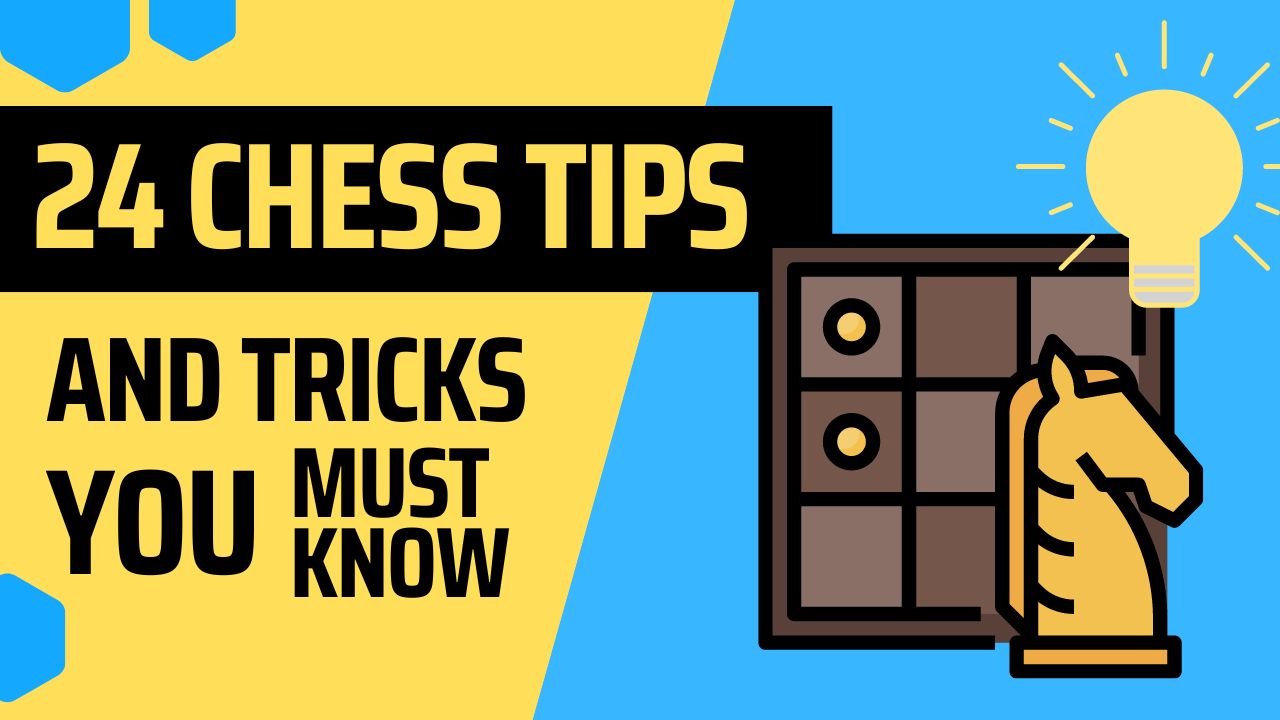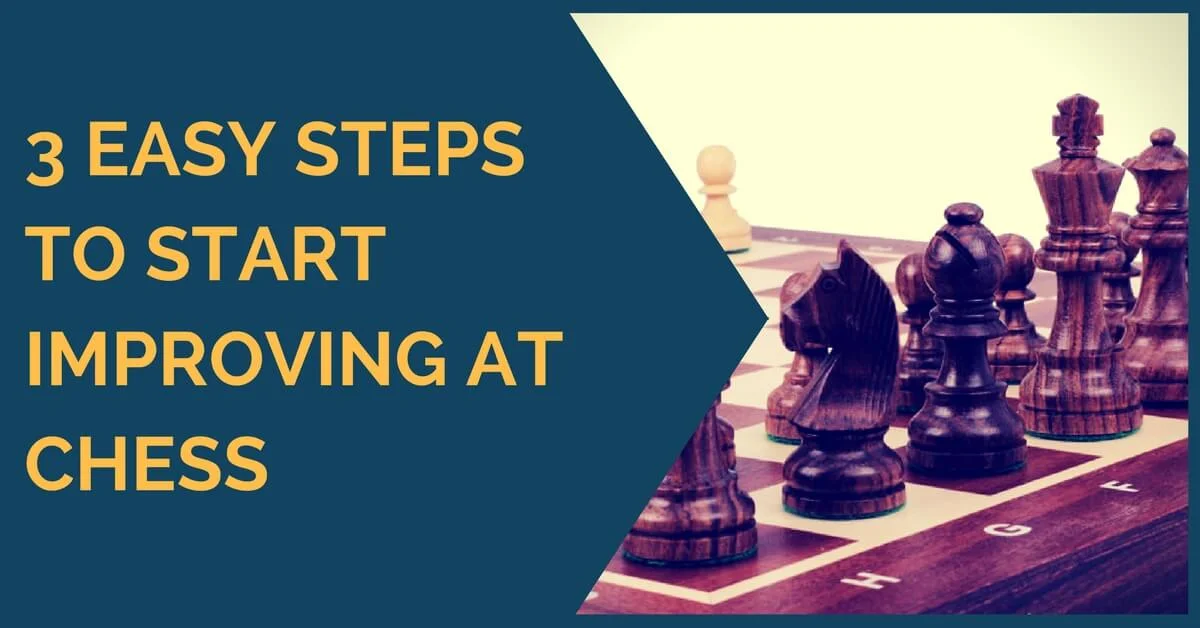24 Chess Tips and Tricks You Must Know

Club players often seek common tips, rules, and ideas to apply in their games.
Having a framework based on general rules is a huge plus in all three phases of chess.
That’s where this article comes into play. We have compiled a list of the 24 most important tips and tricks that will help you make the right decisions and best moves over the board.
Go over those tips, learn the ideas, and apply them in your game. Once you do, the quality of your play will steadily improve!
Let’s get started.
Here are some essential chess tips and tricks that will help you understand the game of chess better.
Opening Tips and Tricks
1. Look for the pawn moves
In the opening first look for a pawn move. Then look for a knight move. Next for a bishop move. Then look for a rook move (or castle). And finally for a queen move.
There is a simple reason for it. Pawns define the pawn structure and occupy space taking it away from opponents’ pawns and pieces. That’s why it is a great idea to control the center with the pawns.
Knights can be developed quickly and start controlling the center. Developing the knights quickly can accelerate casting. The same idea applies to bishops, as they control the important diagonals and also need to be developed before casting.
Rooks usually get developed next, along with the casting. Finally, the queen gets developed. It is the strongest piece. So you don’t want to develop it too early, as it can get under attack.
2. Don’t move the same piece twice
Do not move the same piece more than once in the opening if you do not have a good reason for it (such as material gains). Why? The reason is simple.
By moving the same piece multiple times, you waste time and don’t let other pieces chance to develop.
it is also a good way to avoid a few nasty opening traps.
3. Don’t be greedy for pawns
Do not accept pawn sacrifices during the opening, especially when playing black.
Otherwise, you can get a couple of extra pawns, but also get checkmated quickly because of your underdeveloped pieces. Remember, the main purpose of ‘opening’ is to develop pieces quickly and efficiently.
4. Don’t develop your queen too early
Developing the queen too early in the game is usually bad (see Tip 1). By attacking your queen, your opponent can quickly develop his pieces with a tempo.
5. Gain central control
Fight for the center. Remember, central squares are very important since they provide outposts for your pieces. Therefore, central pawns are considered to be more valuable than flank ones.
6. Sac a pawn to gain initiative
Sometimes, it makes sense to give up a pawn to get an initiative. [Want to learn more about tactics? Read the 10 Tips to Fix Your Chess Tactics]
There are two kinds of sacrifices – sound ones, and mine.
– Mikhail Tal
7. Pawns don’t go back
Always think twice before making a pawn move. Since pawns cannot move backward it is very hard to fix “pawn weaknesses”. Isolated central pawns are usually stronger in the middle game, but weaker in the endgame.
Pawns are the soul of chess.
– Philidor
8. Don’t trade when you are up in space
If you have the spatial advantage, avoid trading pieces. If your opponent has the spatial advantage, trade pieces to eliminate the advantage.
9. If you’re up in pieces trade material
If you have an extra minor piece, exchange pieces to increase your advantage.
If you are a minor piece down trade pawns, not pieces (there is no way to checkmate with a minor piece and a king alone).
Middlegame Tips and Tricks
10. Always have a plan
Always play with a plan. Playing with a bad plan is a lot better than playing with no plan whatsoever.
Without a plan, you’ll be like a boat traveling the ocean without a map. You’ll never make it from point A to point B.
Even a poor plan is better than no plan at all.
– Mikhail Chigorin
11. Know what pieces to trade
Want to know how Grandmasters get an advantage every time they trade pieces? Simple. You exchange active pieces of your opponent for your own inactive pieces (aka trade your bad pieces for their good pieces).
Repeat this a couple of times and the quality of your pieces will jump up.
12. Keep knights in the center, bishops on the flanks
Many beginners have trouble understanding which minor piece is stronger and why. The basic tip when it comes to minor pieces is the following. The knight is stronger in the center, bishop – on the flank.
This is because the knight is the short-range piece, and works the best closer to the action (aka center). The bishop, on the other hand, is a long-range piece. It performs best far from action, hitting opponents pieces from the flanks.
13. Unsure? Keep your Bishop.
As a rule of thumb Bishops are generally more valuable than knights.
Some players even give them 3.5 points vs. 3 points for the knight. So the basic tip for you is, to try not to exchange your bishops for opponents’ knights, especially in the opening.
You never know what kind of middlegame or endgame you’ll play. In many cases, Bishops are very useful. Also by exchanging a bishop for a knight, you lose the bishop pair.
14. Few pawns – bishops stronger. Many pawns – knights are better.
Another rule of thumb when it comes to minor pieces is that bishops are much stronger than knights when only a few pieces are left on the board.
That’s because there is a lot of space for bishops to maneuver. If there are many pawns, and the position is locked up, the knight is a better piece to keep.
This is because knights can jump over other pieces, and work great in tight quarters.
15. Keep the Bishop Pair
The Bishop Pair is stronger than a knight and a bishop or two knights. This is because in optimal configuration the bishop pair can control 28 squares! Bishop + knight can control 22 squares. And two knights can control just 16.
So, keep both of your bishops, my friends.
16. Place your rooks on open files
Rooks belong to open files because as long-range pieces they can exert a lot of pressure on the opponent’s position. But they are locked up by the pawns (your own or the opponent’s) their powers fade.
17. Double the rooks and triple their power
What can be better than a rook on the open file? Doubled rooks on the open file! Doubling the rooks almost triples their power. One rook can stay on the home rank, while the second one can intrude on the opponent’s position, while still being protected by the first rook.
What could be better than this?
18. Two Rooks > Queen
Two rooks are usually stronger than a queen. Two rooks can protect each other and threaten the queen. While the queen will not be able to capture any of the rooks as they are actively protecting each other.
The basic tip here is if you have a choice between keeping the queen or two rooks, the latter is oftentimes a better option.
19. Evaluate the position wisely
In any stage of the game ALWAYS realistically evaluate the position.
Do not underestimate or overestimate the attacking potential of your opponent.
I know it is hard to do, but that’s important. Some players overestimate the opponent’s attack considering that it is dangerous when it’s not, and start passively defending. Some players, completely ignore any attack of the opponent and get checkmated fast.
Endgame Tips and Tricks
20. Activity = Pawn
In the endgame, rook activity is usually worth a pawn. The moral of the story? Whether you are up or down pieces, make sure your rook is active. Active King is usually a plus too.
21. If you’re down in the endgame avoid exchanges
In the endgame, if you are down a pawn, do not exchange pieces. If you exchange pieces off the board, you’ll end up in a losing king and pawn endgame.
This is a terrible place to be.
By keeping the pieces, you can delay or possibly even avoid transitioning to the king and pawn endgame (when you’re down in material).
22. Opposite bishop endgame often leads to a draw
In the opposite bishops endgame, even if you are a pawn down it is usually a draw. if you are down in material, this could be great news. If you know what you’re doing you could get an easy draw.
If you are a pawn up, oh well. You could still try to fight for a win. There is always a chance your opponent will make a mistake and not all opposite bishop endgames are drawn.
23. Place your rook on the 7th and 8th ranks
In the endgame, it is good to place a rook on 7th or 8th rank if you are white and on 2nd or 1st if you are black, attacking pawns and a king.
By doing so, you’ll restrict your opponent’s pawns and pieces and get a good edge.




![5 Things Every Chess Player Should Do to Improve [Cheatsheet Enclosed]](https://thechessworld.com/wp-content/uploads/2017/07/5-things-every-chess-player-should-work-on.webp)





Comments: